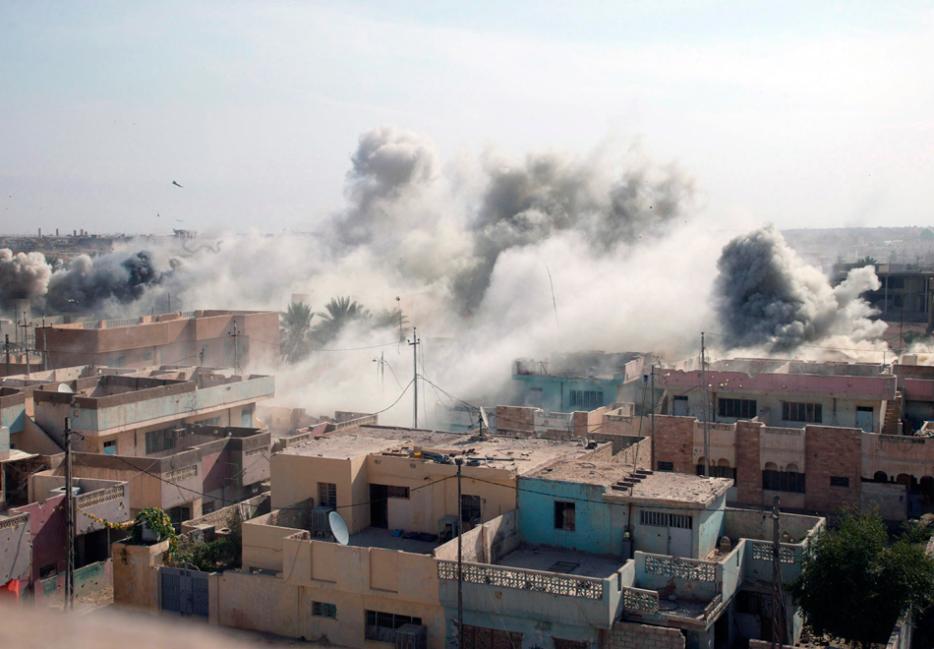The Republic of Iraq lost control over key cities in Anbar province in the past week, with the capital Ramadi and Fallujah falling into al-Qaeda hands. While it’s not exactly clear what the extent of al-Qaeda control is currently, or whether it can be maintained, the Iraqi government is scrambling to use what military it has to retake Anbar. In the meantime, however, al-Qaeda-linked militants are also setting off bombs in Shia parts of Baghdad.
It’s a headline from 2014, but it could just as easily have been 2004, 2005, 2006, or parts of 2007. Despite a few years of relative calm (which would have counted as intolerable bloodletting in almost any other country), the events in Anbar are causing more than a few people to ask what the hell the point of invading Iraq was in the first place.
Yes, it’s horrifying to realize that the world’s leading power created a nation of orphans and widows in error. But, if we can’t quite stomach the moral reckoning, there’s at least the strategic one that needs facing: with thousands of U.S. soldiers dead and billions upon billions of dollars squandered, the grand total of American military accomplishments in Iraq is zero, There were no weapons of mass destruction to find, and the government the Americans left in their wake is evidently too weak to be useful even within its own borders. I wouldn’t bet money on the current regime in Baghdad making it to 2020. Some days, 2015 looks like a stretch.
(The bitterly good news for the United States, however, is that it’s so immensely powerful it can afford a fiasco like Iraq once a generation and keep humming along merrily. Wall Street destroys wealth and U.S. power more efficiently than even military hubris, which is saying something.)
Carl von Clausewitz’s most famous quote—“war is politics by other means”—is often misunderstood as the Prussian theorist normalizing war, as if it were just the latest show on CNN between Wolf Blitzer and whoever isn’t Wolf Blitzer this week. And sometimes, it does feel like that. But Clausewitz was making a more basic point: war is a decision policymakers make to achieve policy aims—even if it’s something as trivial as deciding whether the mayor of Strasbourg will speak German or French. It’s ridiculous, therefore, to talk about who “wins” a war unless we talk about what was actually achieved—and whether it was worth the costs.
Robert Gates has a new memoir coming out, in which he criticizes President Barack Obama for not supporting the war in Aghanistan—in contrast with George W. Bush, whom the former defense secretary says “had no second thoughts about Iraq, including our decision to invade.” No kidding! Gates can’t seem to make up his mind, though: he endorses the broad decisions Obama made in America’s longest war, but still says the president’s “commitment” was lacking.
It’s really not clear what this means (anyone without a copy of the book in hand is reacting to excerpts and reviews). But if America’s war in Afghanistan was materially affected by the emotional or mental commitment of any man several thousand miles away, even the president himself, then something is very, very wrong.
Maybe Gates was just personally disappointed that Obama had no stomach for war. After the example of Iraq, after the even longer example of fruitless struggle in Afghanistan, and with war hawks in Washington pushing for much of his first term to see bombs fall in Tehran, can anyone blame him?
I’ll be curious to see if Gates’s book grapples with the question Clausewitz leaves with all military leaders: is Afghanistan worth it? Given what’s already been spent there both in dollars and lives, can it possibly be? That Islamic Republic holds its next presidential elections in April, and while Hamid Karzai seems to accept that he can’t actually hold the post again—having rigged the last elections with almost Mugabe-esque arrogance—he’s likely to try to retain control informally afterwards. The obvious question is, is this what U.S. soldiers are still dying for?
Gates felt that Vice-President Joe Biden and others close to Obama poisoned the president against the Afghanistan mission by continually bringing him bad news about the war. Whatever Gates’s book claims, it remains that events have not yet proven the Bidens of the world wrong.






